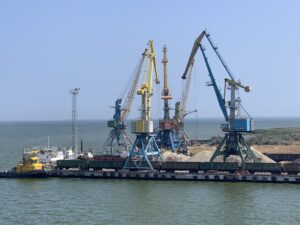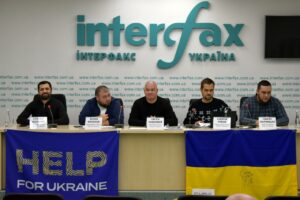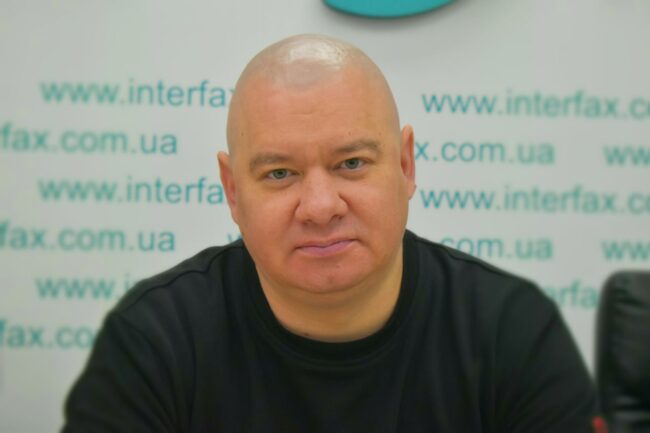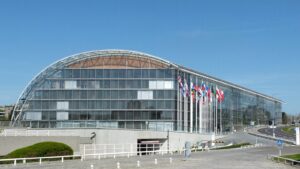
The state intends to attract private investors to lend to projects for the repair, modernization, reconstruction, and construction of strategic port infrastructure facilities in Ukraine with the possibility of compensation for the funds spent through port dues.
The relevant provisions are contained in the draft resolution of the Cabinet of Ministers “Some issues of compensation for investments made by business entities in strategic port infrastructure facilities that are state-owned”, the text of which is posted on the website of the Ministry of Community Development, Territories and Infrastructure (Ministry of Health) for discussion.
The document provides for the approval of the procedure and conditions for concluding agreements on the basis of which investments made by business entities in strategic port infrastructure facilities are compensated, as well as amendments to the Cabinet of Ministers Resolution No. 899 of October 3, 2012, according to which public sector entities may make expenditures on capital investments, in particular on port infrastructure facilities, in the absence of an approved financial plan.
It is noted that the amount of investment compensation should not exceed the amount of funds actually paid by the investor to finance the design or construction of port infrastructure facilities.
In addition, it is noted that the investor may be a legal entity or an individual entrepreneur. There may be several investors at one facility.
At the same time, the new procedure will not apply to legal relations involving business entities that make private investments in port infrastructure facilities on the basis of agreements concluded under public-private partnerships, including concession agreements and lease agreements for state property.
The Ministry of Reconstruction expects that the adoption of this resolution will help restore strategic port infrastructure facilities, accelerate the growth of maritime transport, improve the competitiveness of seaports and increase their investment attractiveness.
“Due to the military aggression of the Russian Federation against Ukraine, there is a problem of insufficient funding for the maritime industry, in particular due to imperfect fiscal policy, which leads to a lack of funds at the state-owned enterprise Ukrainian Sea Ports Authority (USPA),” the explanatory note to the draft resolution says.
It is noted that the USPA has entered into contracts for a number of construction projects, but “due to lack of funds and the state’s dividend policy, it is not possible to implement even part of these projects.”
At the same time, the USPA is facing an acute issue of the need to reconstruct and maintain port infrastructure, including berthing facilities. As of February 24, 2022, the state-owned enterprise had 265 berths (cargo, auxiliary, passenger) located in 13 seaports of Ukraine. Of this number, 20 are unsuitable for normal operation, 37 require significant investment in the next five years, and more than 50 operate with low economic efficiency – they need to be restored through overhaul or reconstruction.
In addition, it is indicated that, according to preliminary calculations, in the period before the full-scale invasion, the need for USPA to finance projects for the reconstruction, modernization and construction of berths alone (more than 48 projects, of which 36 are for reconstruction and modernization) was estimated at UAH 12 billion over four years.

At a meeting on Friday, the government approved a procedure for providing compensation for the cost of engineering and transport infrastructure built by an applicant/investor with significant investments and the costs of connection and connection to engineering and transport networks necessary for project implementation.
“…approved the last regulatory document necessary to launch the mechanism of state support for projects with significant investments. Investors who are ready to implement projects in Ukraine worth EUR 12 million or more will receive maximum assistance and support from us in the form of support, tax and customs benefits, compensation for the cost of constructed engineering and transport infrastructure facilities or connection to engineering and transport networks, etc.”, the release of the Ministry of Economy quotes First Deputy Prime Minister and Minister of Economy Yulia Svyrydenko.
She added that this year the state budget has allocated UAH 3 billion to support such investors.
The Ministry of Economy clarified that investors who plan to implement a project in Ukraine worth EUR 12 million or more with a duration of up to 5 years in the areas of processing industry, mining for further processing or enrichment, transport, logistics, education, research, healthcare, waste management, art, culture, tourism, sports, and electronic communications will be able to receive state support.
To receive support, the applicant (a resident or non-resident legal entity) must submit an application to the Ministry of Economy together with the relevant documents for the evaluation of a project with significant investments, after which the Ministry must evaluate the investment project and provide an opinion on the feasibility/inefficiency of its implementation and the conclusion of a special investment agreement or refusal to conclude it.
After that, a special investment agreement will be concluded between the Cabinet of Ministers, a local government body (if state support is provided by such a body for the implementation of a project with significant investments), an investor with significant investments, and the applicant.
In addition, to support the preparation and implementation of an investment project with significant investments, the applicant must contact UkraineInvest for information and advisory assistance.
The Ministry of Economy emphasized that investors can receive several types of support from the state, which amount to up to 30% of the amount of an investment project with significant investments, in particular: the preemptive right to use state or communal land plots, compensation for the cost of building engineering and transport infrastructure and the cost of connecting to engineering and transport networks, tax benefits, duty-free import of necessary equipment, as well as exemption from compensation for forestry losses and other costs.
According to the report, projects should include the construction, modernization, technical or technological re-equipment of the relevant investment objects and the creation of new jobs. The investor needs to create at least 10 jobs with a salary at least 50% higher than the average salary in the region for this type of activity, or 30 jobs with a salary at least 30% higher than the average salary in the region for this type of activity, or 50 jobs with a salary at least 15% higher than the average salary in the region for the same type of activity.

DIM Group is developing a format of income-producing real estate, apartments with hotel services as part of its projects, said Daria Bedia, Marketing Director of DIM Group, in response to an inquiry from Interfax-Ukraine.
“We are considering the option of income-producing real estate – an apartment format managed by a professional operator – as part of our projects. This is a separate product that we are actively developing. In two of our projects, we have designed apartments with hotel services as part of residential development,” Bedia said.
According to her, the added value for future investors includes better service for owners of well-known operators, the ability to comfortably accommodate relatives and friends in their homes without violating their privacy, and a well-developed internal infrastructure.
“Apart-hotels are becoming a center of attraction for additional services: spa, restaurant, coworking, children’s areas, etc.”, Bedia added.
DIM Group was founded in 2014 and consists of six companies covering all stages of construction. To date, it has commissioned 12 buildings in six residential complexes with a total residential area of over 218 thousand square meters. Six residential complexes of “comfort+” and “business class” categories are under construction: “New Autograph, Metropolis, Park Lake City, Lucky Land.

In 2024, IMC Agro Holding intends to expand corn crops and return to pre-war agricultural technology, and is also studying two projects to develop processing, the decision on which will be made in May-June, said Alex Lissitsa, SEO of the agricultural holding, at the Forbes Agrifood conference.
“During the two years of war, we have come a long way. We had 120 thousand hectares and 6 elevators. 100 thousand hectares and 5 elevators were under occupation. As a result of the de-occupation, we managed to enter our territory. However, some facilities were destroyed,” he said.
According to him, the new large dairy farm of the agricultural holding, located on the border with Belarus, had to be closed due to the poor condition of the cows after the occupation, as well as the almost completely destroyed logistics infrastructure around Chernihiv, where all bridges were destroyed.
In the first year, 30 thousand hectares of the agricultural holding’s land were in the war zone and were partially mined. The second year of the war was a stage of rethinking for IMC, and in the third year they managed to reach more or less the planned indicators, explained the SEO of the agricultural holding.
According to him, in 2022, IMC was unable to sow its land and grew mainly wheat. In 2024, the agroholding will return to traditional technological maps and expand the area under corn, as in 2023 it managed to get a record harvest of 20 tons per hectare. IMC was able to achieve such results thanks to favorable weather conditions that offset the problem of fertilizer and pesticide shortages. In addition, the agroholding has the necessary capacity to store corn.
Mr. Lissitsa also noted that IMC refused to cooperate with international traders who behaved incorrectly towards most Ukrainian customers. Currently, IMC prefers to cooperate with the domestic grain trader Nibulon, through which it sells about 70% of its products. IMC has also found new suppliers of sunflower seeds – Ukrainian regional companies in Chernihiv region.
“We used to build relationships with large foreign traders, and now we are establishing partnerships with those we have not communicated with before. We were beautiful, fashionable, and it was not very fun to work with them. And now we realized that we are basically still beautiful, but not so fashionable. And we need to work with local businesses. They offered us a helping hand and we started working again. Now we are really rethinking. Many contracts with international traders are still in court. I don’t know when they will end. Huge amounts of money are stuck there. It is really easier for us to drive up to our neighbors, negotiate and shake hands,” stated the IMC SEO.
Lissitsa also said that most agricultural holdings have not invested in machinery over the past two years, but have been living off the purchase of spare parts, and thus most of the agricultural machinery has been produced.
At the same time, the IMC is considering two processing projects in parallel – one with the EBRD and the other with the IFC.
“I can’t tell you yet, but we are looking at these projects very, very closely and will make a decision in May-June this year,” Lissitsa said.
The agroholding’s SEO emphasized that IMC has no problems with financing and has established partnerships with a number of banking institutions.
“Last year, we were probably one of the first in the agricultural sector to receive a new loan from the EBRD during the war. Raiffeisen financed us for the purchase of machinery. Credit Agricole is now adding more,” Lissitsa summarized and advised farmers to establish transparent relations with banks and be ready to provide them with all the information to get financing for new projects.

Charitable Foundation “Help for Ukraine” plans to open a center for psychological and physiotherapeutic rehabilitation of military Step By Step on the basis of sanatorium “Morshynsky” in Lviv region in early 2024, said the president of the Foundation Stepan Aslanyan.
At a press conference in Interfax-Ukraine on Wednesday he specified that the project will be implemented on the basis of leased premises of the central building of the sanatorium.
It was noted that the center for psychological and physiotherapeutic rehabilitation of the military will be equipped with comfortable wards with functional medical beds, equipped with ultrasound diagnostic equipment and laboratory tests.
“We are currently negotiating with specialized certified laboratories for the treatment of the consequences of acubarotraumas in cooperation with professional psychologists,” he said.

In turn, the Vice-President of the organization Vilen Fatalov noted that for a year and a half of work the fund has already implemented a number of projects, including a project to provide equipment to JSC “Nikolaevoblenergo”, which suffered from the Russian aggressor strikes on energy infrastructure facilities in 2022. As part of this project, with the support of German partners, the Foundation delivered 169.7 tons of much-needed equipment, including transformers and generators, to Mykolaivoblenergo.
In addition, the Foundation delivered humanitarian and medical supplies to Mykolaiv and the de-occupied territory of Kherson Oblast.
As part of the project, a mobile water purification unit was delivered and launched for the frontline settlement of Kazatskoye in Kherson Oblast.
At present, the project continues to implement the project “Save Kherson Water”, which provides for the purchase and installation of mobile water purification systems in settlements of Kherson and Mykolaiv regions.

The Foundation is also implementing the project “Beds for IDPs and orphanages”, under which IDPs and orphanages will be provided with 140 beds.
“Unfortunately, the needs for humanitarian aid are not decreasing, they are only growing, and we need to intensify our efforts to support the military and the population,” Aslanian said.

In turn, the fund’s ambassador Yevgeny Koshovy stressed that the organization continues to work towards providing the front with cars. “Unfortunately, cars have become expendable at the front, so we will concentrate our efforts in this direction,” he said.
For his part, Fatalov noted that in realizing its projects, the fund does not seek help from the population, but attracts business and international partners.
“We did not open fees from our citizens, we emphasized Ukrainian business and foreign partners. We must continue to consolidate our efforts and remain united as we were in February 2022. The needs are not getting smaller,” he said.

The European Investment Bank (EIB) will allocate EUR 450 million to Ukraine for two recovery projects, with the first two tranches of EUR 100 million each to be approved by the end of 2023, the press service of the Ministry of Recovery reports.
The funds, with a total budget of EUR450 million, are reportedly allocated to two projects – Ukraine Recovery III FL and Ukraine Water Recovery FL.
Ukraine Recovery III FL (EUR250 million, first tranche – EUR100 million): aims to finance critical social and urban infrastructure. This includes the restoration of infrastructure damaged as a result of Russian aggression and the construction of new basic infrastructure to ensure decent living conditions for displaced persons and host communities;
Ukraine Water Recovery FL (EUR 200 million, first tranche – EUR 100 million): aims to finance investments in critical water infrastructure in areas directly affected by the war or where a significant number of IDPs live. This includes the restoration of water supply and sewerage, including measures to overcome the consequences of the destruction of the Kakhovka dam.
Funds from the European Investment Bank (EIB) are allocated as part of cooperation with Ukraine, the principles of which are laid down in the Memorandum of Understanding signed on June 21, 2023 in London at the URC 2023 conference. The Memorandum provides for the allocation of a total of about EUR 840 million in loans for the implementation of infrastructure rehabilitation projects in Ukraine.
Subject to final approval by the EIB Board of Directors and the EU4U Donor Committee, the first tranches of EUR 100 million will be signed by the end of this year.